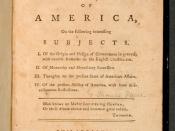Did American colonists consider it important to gain independence from England? Apparently not; Thomas Paine's Common Sense was written to convince colonists that a break with England was inevitable, necessary, and within their capabilities. Paine set up his arguments very carefully. He began by discussing how a government should be set up: without monarchy or hereditary succession. He moved on to the natural rights of human beings from there. By the end of the pamphlet, he talked about the potential of America and how the colonies would defeat Great Britain. Paine smoothly related all these issues back to each other, doing his best to convince the colonists that this opinion of American independence, was just plain common sense.
There was discussion about the proper form of government in Common Sense. Paine argued that government was "a necessary evil" (p74) that "[supplied] the defect of moral virtue" (p75) in even the best circumstances.
The important thing to remember was that it was necessary, but had to be tightly controlled by the people being governed. Another point was that the closer a country got to being a republic, the less need there was for a king. After all, "[i]n England, a king hath little more to do than to make war and give away places...[a] pretty business indeed!" (p86) Hereditary succession was no better. Even if a certain man was a genius at leading a country, there was no guarantee that his descendents would be any better than a "rouge or a fool." (p83) If the colonies were independent, though, they would have the chance to "begin government at the right end" (p105), properly, without a king, without hereditary succession, but with the "charter of government...formed first, and the men delegated to execute them afterward." (p105) The entire setup, from the concept...


